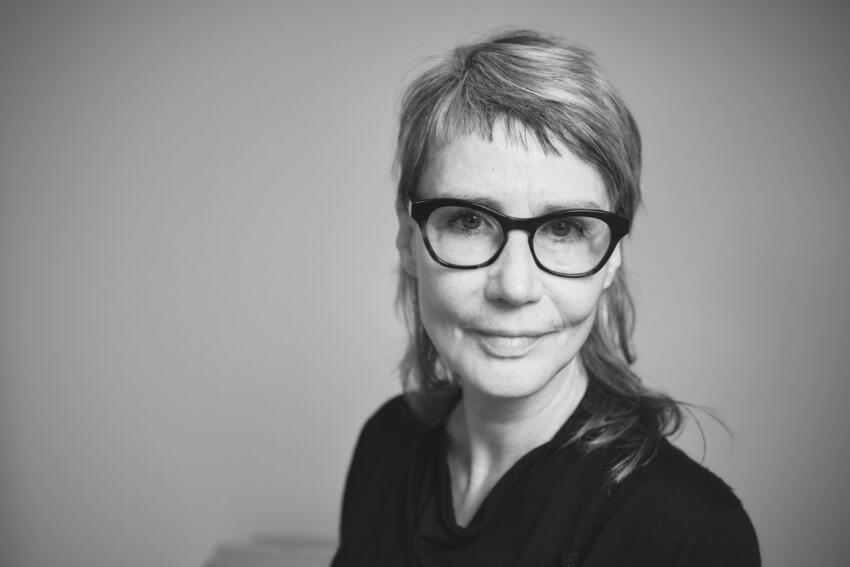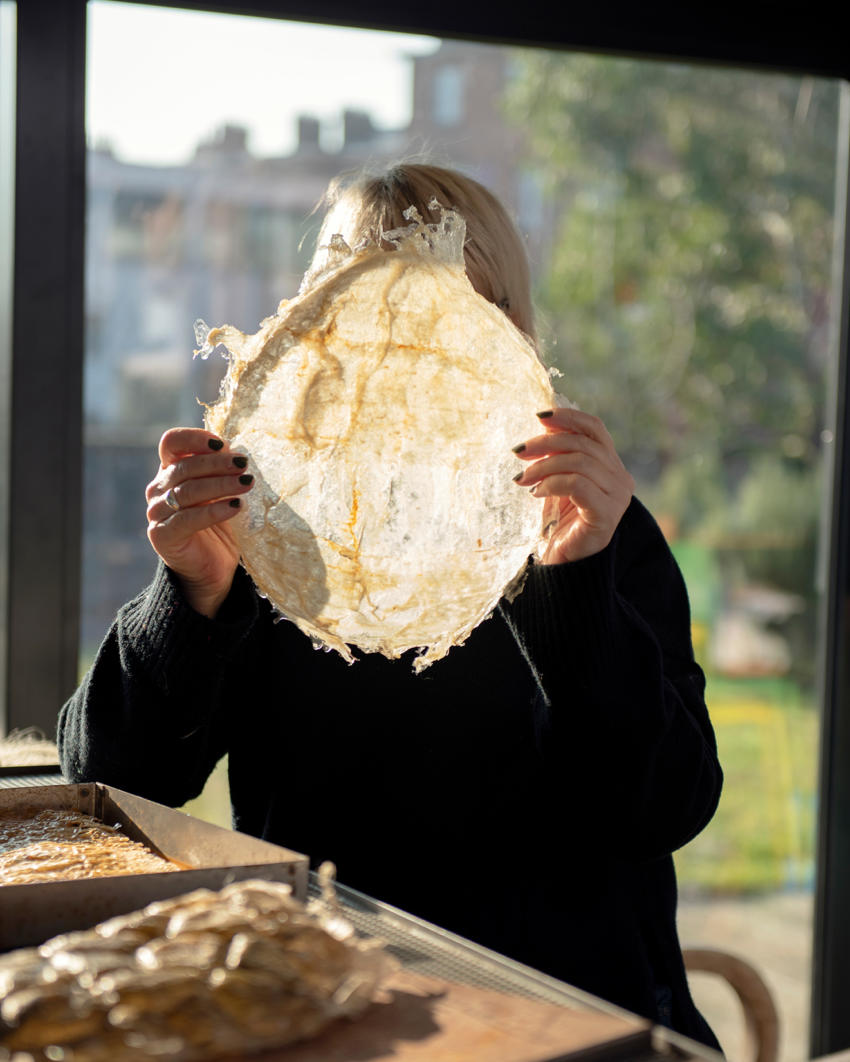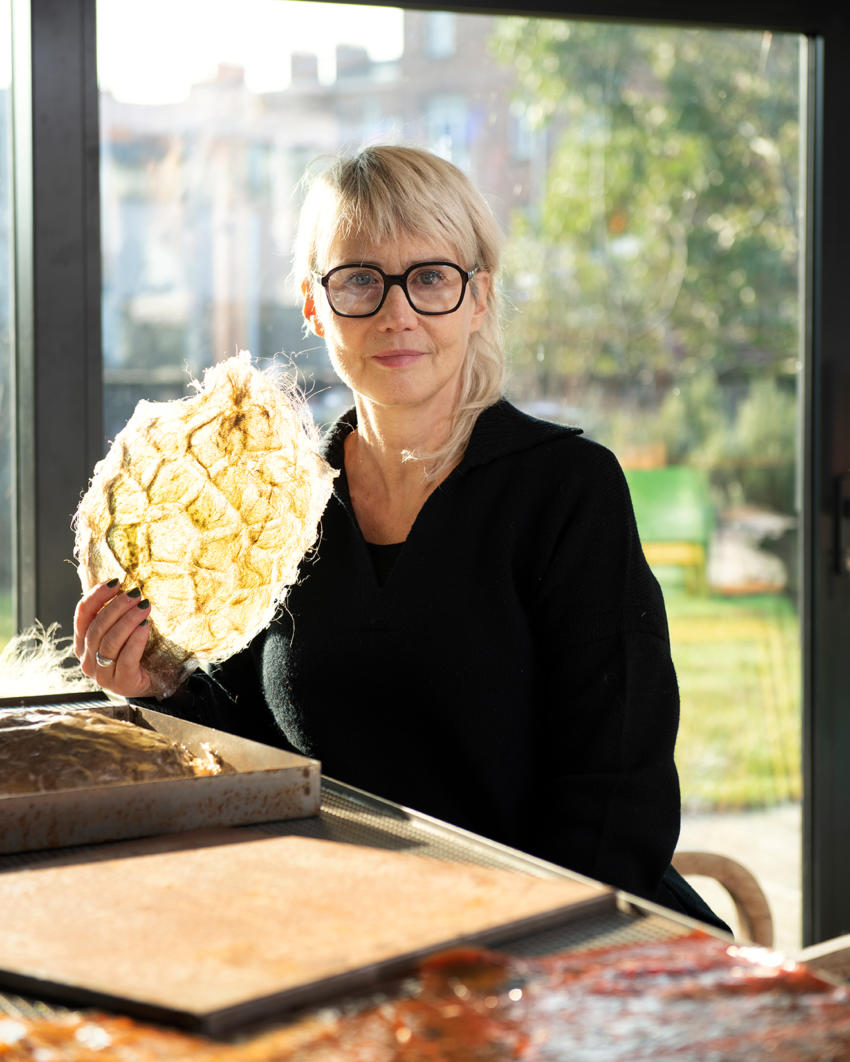AnneMarie Maes (or Annemie Maes) – Brussels, 1955 studied a masters in fine arts at the Sint-Lucas Academy of Fine Arts in Brussels, a masters of cultural studies at the University of Brussels, and a specialisation in anthropological documentary film at the Institute for Sound Image Culture in Brussels.
In 2004 AnneMarie Maes co-founded the artist collective OKNO which has been active on the border between new media and ecology. OKNO uses DIY and collective artist practices to find new ways to engage with the urban environment. In 2009 she founded the Brussels Urban Bee Lab [BUBL] as a spin-off from OKNO. It focuses on urban bee colonies as a vehicle for novel artistic practices to raise ecological awareness.
Maes has for decades been a recognized leader pioneering art-science projects in Belgium, using highly original ways to bring out hidden structures in nature by constructing original technological methods to probe the living world and by translating that in artistic creations through sonification, visualization, sculptures, large-scale long-term installations, and workshops. She thus makes use of technological mediation to search for new forms of communication with the natural world.
The Brussels Urban Bee Lab is an independent international collective of artists, scientists, beekeepers, technicians and creative people. The BUBL uses artistic, scientific and technological research approaches to tackle challenges related to sustainability and the monitoring and survival of city honeybees. Bee colonies are currently threatened in Europe at an alarming rate and BUBL’s research is therefore of great importance, both by raising awareness and by providing unprecedented data for studying bee colony collapse disorder.
An extensive rooftop garden in the centre of Brussels hosts the headquarters of the BUBL laboratory. It is giving place to several experimental beehives and instrumentation equipment. From this laboratory, data is continuously being broadcast through streaming technology.
AnneMarie Maes and the Brussels Urban Bee Lab operate mainly through artistic installations and workshops. AnneMarie Maes has exhibited widely in international contexts, including in various European countries (Austria, Belgium, Croatia, Finland, France, Germany, Spain, Sweden, etc.) as well as the US (New York), Syria, India and Brazil. The installations explore highly experimental technologies, such as microbial fuel cells, digital and organic fabrication using OpenStructures, biomimicry, spatialised sonification, web-based continuous data streaming, data mining based on Artificial Intelligence, organic electronics, solar energy for powering low-energy computing, etc.
The group collaborates with universities and other artistic research centers throughout Europe.
Anne Marie Maes (BE) is an artist and researcher with an extensive track record in socially engaged art projects that strive for greater awareness about the fragility of our natural environment and for the adoption of strategies to mitigate the effects of climate change. She has worked extensively with communities on urban agriculture, the creation of connected urban green corridors and the installation and monitoring of innovative beehives. This translated into documentaries, participatory art works and installations. In parallel, Anne Marie Maes has been exploring the living world for creating a new aesthetic and novel materials such as fabrics based on bacteria, algae and plants. This has also lead to a wide range of art works and installations shown in prestigious galleries and museums. A third strand of Maes her art practice focuses on digital technologies. With her art collective she pioneered in the 1990s a range of innovations for peer-to-peer telecommunication networks, web content creation and environmental monitoring. In the 2000s she worked with AI researchers and robotics engineers to embed intelligence in her bee-related installations and more recently she has been exploring augmented reality and semantic web technologies to raise awareness of the fragile ecologies in the North Sea.
AnneMarie was a fellow in international art/science programs, has written articles and academic papers and has published several publications on her work. She realized artworks commissioned for public space, as ‘Closed Circuits’ (Vlaamse Gemeenschap, Brussels) and ‘Elbe Bienen’ for the art in public space program of the city of Hamburg (De). She was awarded several prizes and mentions in prestigeous festivals as Ars Electronica among others. AnneMarie Maes has exhibited widely as a solo-artist and in group exhibitions in prestigious musea, galleries, public spaces and art-science festivals in many EU countries, the Americas and Asia.
Key museum exhibitions include at Bozar (Brussels, BE), National Arts Museum (Latvia), Borges Cultural Center (Buenos Aires, Argentinia), Domeinen (Sittard, NL), Science and Technology Museum (Milan, IT), Museu do Amanha (Rio de Janeiro, Brasil), Fundacio Miro (Barcelona, ES), Haus der Elektronische Kunste, (Basel, CH), IMAL (Brussels, BE), IKOB Museum of Contemporary art (Eupen, BE), Laboral (Gijon, ES), Museum for Art and Architecture – MAAT (Lisbon, PO), amongst others.
Important festival participations include Ars-Electronica (Linz, AU), Transmediale (Berlin, DE), Mirage Festival (Lyon, FR), PIKSEL (Bergen, NO), Resonances (Ispra, IT).
Gallery shows include at Sapar Contemporary Art (New York), Silva Zona (Korcula, Croatia), Koç University Gallery (Istambul), Skolska Gallery (Prague), PILAR Free University Gallery (Brussels, BE), Wissenschaftskolleg (Berlin,BE), Emergent (Veurne, BE), SongEun ArtSpace (Seoul, South Korea).
————
update korte BIO (2020)
AnneMarie Maes (BE) bevindt zich op het vlak tussen kunst en wetenschap. Ze bestudeert interacties en co-evoluties binnen stedelijke ecosystemen. Haar onderzoekspraktijk combineert kunst en wetenschap, met grote interesse voor DIY-technologieën en biotechnologie. Ze werkt met een scala aan biologische, digitale en traditionele media, waaronder levende organismen. Haar artistiek onderzoek materialiseert zich in techno-organische objecten die geïnspireerd zijn op feitelijke/fictionele verhalen; in artefacten die een combinatie zijn van digitale fabricage en vakmanschap; in installaties die zowel het probleem als de mogelijke oplossing weerspiegelen, in multispecies samenwerkingen, in polymorfe vormen en modellen gecreëerd door eco-data. Zowel Bee agency als Laboratory for Form and Matter, waarin ze experimenteert met bacteriën en levend textiel, vormen een kader voor een breed scala aan installaties, sculpturen, fotowerken, objecten en boeken. Het Intelligent Guerilla Beehive project kreeg een Eervolle Vermelding in de categorie Hybride Kunst tijdens Ars Electronica.
update 2017 (korte bio nl)
AnneMarie Maes is kunstenaar en onderzoeker. Ze is mede-oprichter van de kunstenaars-collectieven OKNO en So-on. In haar artistieke praktijk combineert ze kunst en wetenschap met een sterke interesse voor DIY-technologieën en het gebruik van intelligente materialen. Onder de naam ‘Laboratory for Form and Matter’ is haar atelier een broedplaats voor innovatieve praktijken, waarin high-end bioresearch gecombineerd wordt met ambachtelijke technieken. Ze werkt met digitale en traditionele media en associëert meerdere disciplines zoals beeldhouwen, 3D printing, fotografie, audiovisuele realisaties en mixed media installaties.
Biomimesis is het uitgangspunt voor het ecologisch her-denken van materie en vorm in haar kunstpraktijk. Basismaterialen voor objecten en installaties worden ontwikkeld ism. bacteria en andere micro-organismen. De kunstwerken en objecten die hieruit ontstaan roepen veel meer op dan een puur esthetische beleving van schoonheid. Er wordt gebruik gemaakt van geavanceerde informatietechnologieën en van synthetische biologie om innovatieve samenwerkingen met de natuur aan te gaan. Het resultaat -werken gerealiseerd uit combinaties van digitale fabricatie, organische groei en handmatige technieken- intrigeren de kijker door hun bizarre vormelijke structuren en door het gebruik van buitengewone materialen. Voor haar experimenten werkt zij samen met wetenschappelijke partners in Brussel (VUB, materialen onderzoek) en in Barcelona (Universitat Pompeu Fabra, bio-hacklab), evenals met architecten en designers (IAAC architecture school Barcelona) en Green Fablab (Barcelona).
AnneMarie Maes exposeert regelmatig in binnen- en buitenland (voor volledige lijst zie CV op website http://annemariemaes.net).
Het laatste jaar (2016) waren er tentoonstellingen in Berlijn, Brussel en Barcelona, evenals presentaties, residenties en workshops in Italië en Barcelona. In december 2016 was er in Brussel de solo tentoonstelling Sensorial Skin samen met de presentatie van de publicatie Alchemia Nova, uitgegeven door de MER. Paper Kunsthalle.
In mei 2017 ontving AnneMarie Maes een Ars Electronica award in de discipline Hybrid Art, voor haar project ‘Sensorial Skin for a Guerilla Beehive’.
Voor het najaar van 2017 staan nog een ganse reeks tentoonstellingen op stapel: Grey)(Area in Korcula, Croatië; Ecovention in De Domeinen Sittard, Nl; Ars Electronica CyberArts in Linz, Oostenrijk; Tendencies in Bozar, Brussel; ResonancesII in Ispra en Milaan, Italië; NovaXX in de St.Gorikshallen Brussel.
——————-
(lange bio nl)
AnneMarie Maes (1955, Leuven) heeft een master in de Schone Kunsten (Sint Lukas, Brussel), master na master in Culturele Studies (VUB) en een getuigschrift Culturele Anthropologische Film (SIC). Ze heeft de laatste decenia een belangrijke rol gespeeld in de ontwikkeling van de multimedia kunstscène in Brussel, onder meer als oprichter van Pix en Motion (1986-2000), een productiehuis voor experimentele (animatie)film; oprichter en curator van Looking Glass (1999- 2004), een kunstruimte in het centrum van Brussel met focus op installatiekunst en performance die jonge kunstenaars eerste kansen heeft geboden; en mede-oprichter van het internationaal kunstenaarscollectief OKNO (Brussel) waarvoor ze de EU-DG-culture projecten Time Inventors Kabinet (2010-2012) en A Laboratory On The Open Fields (2013-2015) leidde.
AnneMarie Maes is sinds het beëindigen van haar studies actief als professioneel kunstenaar. Haar werk is opgesteld in openbare ruimten en opgenomen in verzamelingen (bvb. Stichting Liedts-Meesen Gent). Haar werk wordt uitgebreid tentoongesteld in kunstenfestivals (bvb. Burning Ice, Kaaiteater) maar ook in musea (bvb. Museum of Contemporary Art Riga) en kunstencentra (bvb. Borges, Buenos Aires; Skolska, Praag; Bozar, Brussel; Koç, Istanbul). Het is bovendien opgenomen in diverse catalogi en verschenen als solo-publicaties (The Transparent Beehive, Connected OpenGreens, Politics of Change).
Haar artistiek werk kent verschillende fazen. In een eerste faze was ze vooral actief in het domein van multi-media kunst met grote installaties, dikwijls in openbare ruimten. Een voorbeeld hiervan zijn de installaties Closed Circuits (Brussel/Tokyo/New York) (2000) opgesteld in het Boudewijngebouw van de Vlaamse Gemeenschap in Brussel en NoToVo (Happy New Ears/ Festival van Vlaanderen Kortrijk) waarin het publiek zelf een soundscape samenstelt door te bewegen doorheen een lege ruimte met virtuele geluidsbronnen gebaseerd op literaire fragmenten.
In een tweede faze heeft haar werk een sociaal-anthropologische invalshoek. Voorbeelden hiervan zijn het People Database Project (1998- 2006) dat samen met het publiek een collectieve narratieve lijn opbouwt vertrekkende van found footage foto’s en met introductie van netwerktechnieken (tentoongesteld o.a. in Ici et Maintenant, Thurn&Taxis Brussel; het Groot Beschrijf, Brussel; Beursschouwburg, Brussel ), en het Politics of Change Project (2008-2010) dat het grassroots activisme van een vrouwengroep in India documenteert (o.a. tentoongesteld in Pixelache Festival, Helsinki; Vooruit, Gent).
Meer recent werk vertoont sterke banden met technologie en wetenschap, legt een grote bezorgdheid aan de dag voor ecologie, en demonstreert een sterke artistieke en esthetische behoefte om ‘het onzichtbare in de natuur zichtbaar te maken’. Dit gebeurt door multi-mediaal werk: videos die (minimale) processen en aspecten van de natuur uitlichten, foto’s gemaakt met hooggespecializeerde electronmicroscopen, installaties in de vorm van observatiestations zoals transparante bijenkasten, tuinen aangelegd in vensterloze fabriekshallen (the Invisible Garden), audiowerken die natuurlijke geluiden verweven met electronische klanken (SoundBees, Kunstradio), geometrische sculpturen gerealiseerd naar patronen uit de natuur (bvb. formaties van octahedrons, mathematisch opgebouwd als in een bijenraat) en die uitgevoerd worden in natuurlijke materialen zoals was en latex.
Het oeuvre van AnneMarie Maes is sinds midden 2015 in een nieuwe faze terechtgekomen waarbij de focus verschuift van collectief werk naar meer individuele creaties. Ze concentreert zich nu vooral op de plastische kant van de kunst, eerder dan de technische of sociale kant. Internationale tentoonstellingen zitten in een stroomversnelling (Argentinie, Latvia, Spanje) en er is groeiende belangstelling in België; en met o.a. een lopende residentie in Berlijn (2015-2016). Er is belangstelling vanuit verschillende galerijen om haar werk te vertegenwoordigen.
AnneMarie Maes exposeert regelmatig, zowel nationaal als internationaal. Haar werk werd o.a. geprogrammeerd in de Vooruit (Gent), Stuk (Leuven), Okno (Brussel, TIK – Open House), Kaaitheater (Brussel), Buda (Kortrijk), Bozar (Brussel) maar ook in Oostenrijk (Graz), Croatia (Zagreb), Finland (Pixelache, Helsinki), Frankrijk (Mal au Pixel, Parijs), Duitsland (Transmediale, Berlijn – Documenta, Kassel), Tsjechië (Praag), Riga (Letland), Spanje (Barcelona), Zweden (Umea, ETC), US (New York, Matrix Art Project), Syria (Damascus), India (Mumbai, Delhi) Turkije (Istanbul), Argentinia (Buenos Aires) en Brazilië (Sao Paulo).
voor meer informatie: AnneMarie Maes’ webpagina op BAMart (Instituut voor Beeldende, Audiovisuele en Mediakunst)


